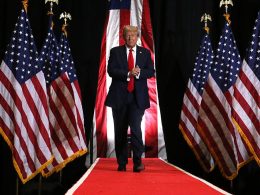Investors and traders got a good laugh last week when Target’s CEO Brian Cornell suggested that a lousy quarter was partly the result of a consumer backlash against the retailer for rolling back its DEI efforts, On The Money has learned.
DEI, or Diversity Equity and Inclusion, is a management philosophy that says pure merit-based hiring is overrated. Instead, companies must tailor their workforces to match an intersectional matrix — skills be damned. DEI also holds sway over ads, marketing and other corporate functions.
Under Cornell, Target went all in on DEI, most infamously in its Pride celebrations, a corporate marketing and sales effort that targeted the LBGTQ+ community. Nothing wrong with that – unless you do it in a way that spoils the shopping experience of most of your customers.
Those are mainly working class people who just want to buy Target’s low-priced goods and didn’t want the company to proselytize to them about gender fluidity – particularly when they show up to a store with their kids.
As I wrote in my book “Go Woke Go Broke: The Inside Story of the Radicalization of Corporate America,” Target and Cornell were on the cutting edge of the woke movement and took it to disastrous extremes. Google the product known as the “tuck-friendly bathing suit” and you will get the full story so I don’t have to recite the gory details.
In 2023, a full-on customer revolt ensued, and let’s say Target never recovered.
Earlier in the year, Target took note and began to unwind some of its DEI policies. Gone also were the flamboyant Pride displays. DEI in hiring was rolled back after the courts ruled that discriminating based on race is illegal, and the Trump administration announced it will enforce these edicts.
Now, if Cornell is to be believed, Target is suffering from what might best be described as a counter-customer revolt. Our very own Rev. Al Sharpton believes DEI is a civil right, and recently said he would support a boycott of Target stores.

Target’s latest quarterly earnings of $1.30 a share and revenue drop to $23.8 billion both missed estimates – and by a lot. All this and the impact of the Trump tariff increases hasn’t totally settled in.
Cornell’s explanation to investors for all of the above: Ending DEI and becoming less political represented a “headwind.” That’s why investors and traders who spoke to On The Money are getting a chuckle out of Cornell’s rationalization. It makes no sense because Target has been flailing for a while, mostly after it went all in on woke.
As my pal the “Sarge,” the veteran trader and investor Stephen Guilfoyle, wrote in The Street.com: “For Target, this was the third quarter in five that the firm failed to both meet Wall Street’s projections for adjusted profitability and Wall Street’s expectations for total revenue generation. Going further back, Target has failed to meet earnings expectations for six of the past 13 quarters.”
On The Money asked a Target rep how Cornell could be so sure DEI headwinds, and not management ineptitude (analysts say its stores are in need of a massive upgrade), are to blame for the lousy first-quarter results. We will let you know what they say when (if) they get back to us.








